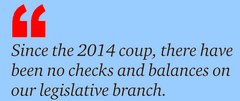
The National Legislative Assembly (NLA) finally backed down at the last minute yesterday from pressing ahead with the rice bill even though it insisted on Monday that it would go ahead with the deliberation of the controversial draft legislation.
Following fierce public opposition, the NLA earlier yielded to adjust the bill, saying that every point of contention raised by rice farmer representatives and academics had been fixed.

Soonruth Bunyamanee is editor, Bangkok Post.
Nipon Poapongsakorn, a distinguished fellow of the Thailand Development Research Institute (TDRI), who floated his concern about the defects of the bill, confirmed that the contentious issues, particularly those which ban farmers from keeping rice seeds and punish them for such violations, have been removed from the bill. However, it still contains some other controversial issues such as the empowerment of the Rice Department.
It is good to know that the NLA finally listened to the voice of the public and stakeholders. But it would have been much better if the assembly listened to them before coming up with a bill which contained so many flaws.

However, the withdrawal of the rice bill alone is not enough. Both the Prayut Chan-o-cha government and the NLA, appointed by the National Council for Peace and Order (NCPO), should stop rushing to approve controversial projects and pushing for the enactment of laws because these moves could be deemed conflicts of interest as a result of improper and flawed processes.
With the general election set to take place in just 25 days, the government and the NLA should shelve all projects and legislative proposals so they can be deliberated by a new government and elected lawmakers.
Like it or not, NCPO chairman and Prime Minister Prayut is the prime ministerial candidate of the Palang Pracharath Party (PPRP).
His government must stop any policy deemed to be populist, particularly those involving new concessions for private operators and auctions for several projects. Meanwhile, the NLA must cease its lawmaking processes and leave it to the next government.
Imagine what would have happened to Thai rice farmers and the country's rice sector if the bill had been passed by the NLA with the contentious points still in it. Who really benefits from a bill which bans farmers from collecting rice grains? Opponents said the bill was designed to benefit large-scale commercial producers.
Since the 2014 coup, there have been no checks and balances on our legislative branch. There has also been no proper public participation in legislation.
The deliberation of the rice bill is not the first, and will likely not be the last, example of this problem.
On Friday, with the public keeping a close eye on the controversial rice bill, the NLA delayed its plan to deliberate it. Instead, it approved another bill revising the 1992 Factory Act which bypasses the process of factory licence renewal, raising concerns over potential adverse effects.
Currently, there are more than 60,000 factories in Thailand.
The government, which sponsored the new legislation, claims the revision is needed to tackle corruption and ease the regulatory burden on investors and factory owners.
In addition, the revised act changes the definition of "factory", which will result in looser regulations, including on the establishment of new factories.
For example, under the current act, a "factory", which is subject to state regulation, is defined as a place where machinery of 5 horsepower or more is installed or there are at least seven people working. But the new law redefines the term as premises with machinery exceeding 50 horsepower or with 50 workers or more.
Under the current act, regulated factories cannot be established near residential areas. But the new law will set many small factories free from this stipulation.
On any given day, a metal recycling factory could now be set up next or close to your house.
The new law may also bring about harmful pollution. Without the need for factory licences to be renewed, the establishment of new factories is being encouraged. Meanwhile, many "small factories" will be completely freed from state regulation.
In almost five years, the coup-installed NLA has deliberated 509 bills, of which 412 have come into law. That means it has passed about 100 laws a year. To be fair, many of them are necessary to solve chronic problems in the country such as the law addressing illegal and unregulated fishing and legislation boosting aviation standards.
But every coin has two sides. The NLA's legislative process has lacked proper oversight mechanisms, including public participation.
We may not yet have seen the negative consequences of some of those laws. But they could happen anytime in the future.
The NLA and the government are expected to stay around for another four months until a new administration and a new parliament take their oaths of office. Instead of proceeding with deliberating more bills in the pipeline, the coup-installed legislative assembly must suspend its lawmaking during this period.
